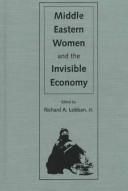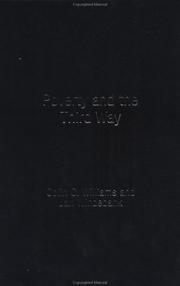| Listing 1 - 10 of 64 | << page >> |
Sort by
|
Book
ISBN: 3030705242 3030705234 Year: 2021 Publisher: Cham, Switzerland : Springer,
Abstract | Keywords | Export | Availability | Bookmark
 Loading...
Loading...Choose an application
- Reference Manager
- EndNote
- RefWorks (Direct export to RefWorks)
Informal sector (Economics) --- Hidden economy --- Parallel economy --- Second economy --- Shadow economy --- Subterranean economy --- Underground economy --- Artisans --- Economics --- Small business
Book
ISBN: 981164280X 9811642818 Year: 2022 Publisher: Gateway East, Singapore : Palgrave Macmillan,
Abstract | Keywords | Export | Availability | Bookmark
 Loading...
Loading...Choose an application
- Reference Manager
- EndNote
- RefWorks (Direct export to RefWorks)
Informal sector (Economics) --- Hidden economy --- Parallel economy --- Second economy --- Shadow economy --- Subterranean economy --- Underground economy --- Artisans --- Economics --- Small business
Book
ISBN: 3428469321 3428069323 Year: 1990 Publisher: Duncker & Humblot
Abstract | Keywords | Export | Availability | Bookmark
 Loading...
Loading...Choose an application
- Reference Manager
- EndNote
- RefWorks (Direct export to RefWorks)
Informal sector (Economics) --- Hidden economy --- Parallel economy --- Second economy --- Shadow economy --- Subterranean economy --- Underground economy --- Artisans --- Economics --- Small business --- Makroökonomie --- Schattenwirtschaft
Book
ISBN: 1920596267 9781920596262 Year: 2015 Publisher: Cape Town, [South Africa] : Southern African Migration Programme (SAMP) : International Migration Research Centre (IMRC),
Abstract | Keywords | Export | Availability | Bookmark
 Loading...
Loading...Choose an application
- Reference Manager
- EndNote
- RefWorks (Direct export to RefWorks)
The study demonstrates that informal cross-border is a complex phenomenon and not uniform across the region, or even through border posts of the same country. However, the overall volume of trade, duties paid and VAT foregone, as well as the types of goods and where they are produced, indicate that this sector of regional trade should be given much greater attention and support by governments of the region as well as regional organizations such as the Common Market for Eastern and Southern Africa (COMESA), SADC and the Southern African Customs Union (SACU).
Informal sector (Economics) --- Hidden economy --- Parallel economy --- Second economy --- Shadow economy --- Subterranean economy --- Underground economy --- Artisans --- Economics --- Small business --- Africa, Southern --- Southern Africa --- Commerce. --- South Africa --- E-books
Book
ISBN: 1920596275 9781920596279 9781920596101 1920596100 Year: 2018 Publisher: Baltimore, Maryland : Baltimore, Md. : Project Muse, Project MUSE,
Abstract | Keywords | Export | Availability | Bookmark
 Loading...
Loading...Choose an application
- Reference Manager
- EndNote
- RefWorks (Direct export to RefWorks)
While increasing attention is being paid to the drivers and forms of entrepreneurship in informal economies, much less of this policy and research focus is directed at understanding the links between mobility and informality. This report examines the current state of knowledge about this relationship with particular reference to three countries (Mozambique, South Africa and Zimbabwe) and four cities (Cape Town, Harare, Johannesburg and Maputo), identifying major themes, knowledge gaps, research questions and policy implications.
Informal sector (Economics) --- Immigrant business enterprises --- Immigrant-owned business enterprises --- Business enterprises --- Hidden economy --- Parallel economy --- Second economy --- Shadow economy --- Subterranean economy --- Underground economy --- Artisans --- Economics --- Small business
Book
ISBN: 9781911116325 1911116320 9781788212069 1788212061 9781911116301 1911116304 9781911116318 1911116312 Year: 2019 Publisher: Newcastle upon Tyne : Agenda Publishing Limited,
Abstract | Keywords | Export | Availability | Bookmark
 Loading...
Loading...Choose an application
- Reference Manager
- EndNote
- RefWorks (Direct export to RefWorks)
An authoritative introduction to economic activity and income outside of government regulation, taxation and observation. The books examines its importance and characteristics in developed, developing and transitional economies, and its role as a driver of economic growth.
E-books --- Informal sector (Economics) --- Hidden economy --- Parallel economy --- Second economy --- Shadow economy --- Subterranean economy --- Underground economy --- Artisans --- Economics --- Small business
Book
ISBN: 9781928331797 1928331793 9781928331803 1928331807 1928331785 9781928331780 Year: 2019 Publisher: Baltimore, Maryland : Project Muse,
Abstract | Keywords | Export | Availability | Bookmark
 Loading...
Loading...Choose an application
- Reference Manager
- EndNote
- RefWorks (Direct export to RefWorks)
The persistence of indigenous African markets in the context of a hostile or neglectful business and policy environment makes them worthy of analysis. An investigation of Afrocentric business ethics is long overdue. Attempting to understand the actions and efforts of informal traders and artisans from their own points of view, and analysing how they organize and get by, allows for viable approaches to be identified to integrate them into global urban models and cultures. Using the utu-ubuntu model to understand the activities of traders and artisans in Nairobi's markets, this book explores how, despite being consistently excluded and disadvantaged, they shape urban spaces in and around the city, and contribute to its development as a whole. With immense resilience, and without discarding their own socio-cultural or economic values, informal traders and artisans have created a territorial complex that can be described as the African metropolis. African Markets and the Utu-buntu Business Model sheds light on the ethics and values that underpin the work of traders and artisans in Nairobi, as well as their resilience and positive impact on urbanisation. This book makes an important contribution to the discourse on urban economics and planning in African cities.
E-books --- Informal sector (Economics) --- Kenya --- Economic conditions. --- Hidden economy --- Parallel economy --- Second economy --- Shadow economy --- Subterranean economy --- Underground economy --- Artisans --- Economics --- Small business

ISBN: 0813015774 0813022916 9780813022918 9780813015774 Year: 1998 Publisher: Gainesville : University Press of Florida,
Abstract | Keywords | Export | Availability | Bookmark
 Loading...
Loading...Choose an application
- Reference Manager
- EndNote
- RefWorks (Direct export to RefWorks)
Women --- Informal sector (Economics) --- Labor & Workers' Economics --- Business & Economics --- Employment --- Hidden economy --- Parallel economy --- Second economy --- Shadow economy --- Subterranean economy --- Underground economy --- Human females --- Wimmin --- Woman --- Womon --- Womyn --- Artisans --- Economics --- Small business --- Females --- Human beings --- Femininity --- Arab countries --- E-books

ISBN: 0415257255 1134517769 1280195452 0203167465 0203283023 1138883360 9780203167465 9781134517763 9781134517718 1134517718 9781134517756 1134517750 9781138883369 9780415257251 Year: 2003 Publisher: New York : Routledge,
Abstract | Keywords | Export | Availability | Bookmark
 Loading...
Loading...Choose an application
- Reference Manager
- EndNote
- RefWorks (Direct export to RefWorks)
What is poverty and how can it be tackled? Taking the Third Way out of its narrow political context, this thought-provoking new approach argues that we need to harness work beyond employment to pave a Third Way beyond capitalism and socialism.
Informal sector (Economics) --- Mixed economy. --- Mutualism. --- Poverty. --- Destitution --- Mutuality --- Economy, Mixed --- Third way (Economics) --- Hidden economy --- Parallel economy --- Second economy --- Shadow economy --- Subterranean economy --- Underground economy --- Wealth --- Basic needs --- Begging --- Poor --- Subsistence economy --- Cooperation --- Economics --- Socialism --- Capitalism --- Artisans --- Small business
Book
ISBN: 1920596429 9781920596422 9781920596408 Year: 2017 Publisher: Waterloo, Ontario : Southern African Migration Programme,
Abstract | Keywords | Export | Availability | Bookmark
 Loading...
Loading...Choose an application
- Reference Manager
- EndNote
- RefWorks (Direct export to RefWorks)
To understand the policy environment within which refugees establish and operate their enterprises in South Africa's informal sector, this report brings together two streams of policy analysis. The first concerns the changing refugee policies and the erosion of the progressive approach that characterized the immediate post-apartheid period. The second concerns the informal sector policy, which oscillates between tolerance and attempted destruction at national and municipal levels. While there have been longstanding tensions between foreign and South African informal sector operators, an overtly anti-foreign migrant sentiment has increasingly been expressed in official policy and practice. This report describes the strategies being used to turn South Africa into an undesirable destination for refugees, including the setting up of additional procedural, administrative and logistical hurdles; the undercutting of court judgments affirming the right of asylum-seekers and refugees to employment and self-employment; ensuring that protection is always temporary by making it extremely difficult for refugees to progress to permanent residence and eventual citizenship; and restricting opportunities to pursue a livelihood in the informal sector. The authors conclude that the protection of refugee rights is likely to continue to depend on a cohort of non-governmental organizations prioritizing migrant livelihood rights and being willing and able to pursue time-consuming and costly litigation on their behalf.
Refugees --- Informal sector (Economics) --- Displaced persons --- Persons --- Aliens --- Deportees --- Exiles --- Hidden economy --- Parallel economy --- Second economy --- Shadow economy --- Subterranean economy --- Underground economy --- Artisans --- Economics --- Small business --- Economic conditions. --- Government policy
| Listing 1 - 10 of 64 | << page >> |
Sort by
|

 Search
Search Feedback
Feedback About UniCat
About UniCat  Help
Help News
News